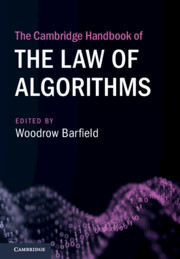Book contents
- The Cambridge Handbook of the Law of Algorithms
- The Cambridge Handbook of the Law of Algorithms
- Copyright page
- Contents
- Figures
- Tables
- Notes on Contributors
- Foreword
- Preface
- Acknowledgements
- Abbreviations
- Part I Introduction and Setting the Stage for a Law of Algorithms
- Part II Business, Regulations, and Decision-Making with Algorithms
- Part III Intellectual Property and Algorithms
- Part IV Criminal Law, Tort Issues, and Algorithms
- Part V Constitutional Law, Human Rights, and Algorithms
- 24 Human Rights-Based Approach to AI and Algorithms
- 25 Four Modes of Speech Protection for Algorithms
- 26 Algorithms and Freedom of Expression
- 27 Artificial Minds in First Amendment Borderlands
- 28 The First Amendment and Algorithms
- 29 Algorithmic Analysis of Social Behavior for Profiling, Ranking, and Assessment
- 30 Algorithmic Stages in Privacy of Data Analytics
- Part VI Applications and Future Directions of Law and Algorithms
- Index
29 - Algorithmic Analysis of Social Behavior for Profiling, Ranking, and Assessment
from Part V - Constitutional Law, Human Rights, and Algorithms
Published online by Cambridge University Press: 19 October 2020
- The Cambridge Handbook of the Law of Algorithms
- The Cambridge Handbook of the Law of Algorithms
- Copyright page
- Contents
- Figures
- Tables
- Notes on Contributors
- Foreword
- Preface
- Acknowledgements
- Abbreviations
- Part I Introduction and Setting the Stage for a Law of Algorithms
- Part II Business, Regulations, and Decision-Making with Algorithms
- Part III Intellectual Property and Algorithms
- Part IV Criminal Law, Tort Issues, and Algorithms
- Part V Constitutional Law, Human Rights, and Algorithms
- 24 Human Rights-Based Approach to AI and Algorithms
- 25 Four Modes of Speech Protection for Algorithms
- 26 Algorithms and Freedom of Expression
- 27 Artificial Minds in First Amendment Borderlands
- 28 The First Amendment and Algorithms
- 29 Algorithmic Analysis of Social Behavior for Profiling, Ranking, and Assessment
- 30 Algorithmic Stages in Privacy of Data Analytics
- Part VI Applications and Future Directions of Law and Algorithms
- Index
Summary
In this chapter, we look at the global development of “people-scoring” and its implications. Unlike traditional credit scoring, which is used to evaluate individuals’ financial trustworthiness, social scoring seeks to comprehensively rank individuals based on social, reputational, and behavioral attributes. The implications of widespread social scoring are far-reaching and troubling. Bias and error, discrimination, manipulation, privacy violations, excessive market power, and social segregation are only some of the concerns we have discussed and elaborated on in previous works.1 In this chapter, we describe the global shift from financial scores to social credit, and show how, notwithstanding constitutional, statutory, and regulatory safeguards, the United States and other Western democracies are not as far from social credit as we seem to believe.
Information
- Type
- Chapter
- Information
- The Cambridge Handbook of the Law of Algorithms , pp. 632 - 653Publisher: Cambridge University PressPrint publication year: 2020
